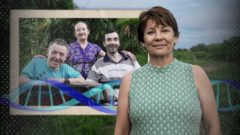**Dane, known for his roles in popular series like Euphoria and Grey's Anatomy, speaks openly about his health challenge while preparing to rejoin the Euphoria set.**
**Eric Dane Reveals ALS Diagnosis: A New Chapter Ahead**

**Eric Dane Reveals ALS Diagnosis: A New Chapter Ahead**
**Euphoria and Grey's Anatomy star Eric Dane shares his journey following an ALS diagnosis, emphasizing gratitude and family support.**
In a heartfelt revelation, Eric Dane, the 52-year-old actor famed for his roles in HBO's "Euphoria" and "Grey's Anatomy," has disclosed his recent diagnosis of amyotrophic lateral sclerosis (ALS), a debilitating neurodegenerative condition commonly recognized as Lou Gehrig's disease. In an interview with People, Dane expressed deep appreciation for the support of his family as they confront this new chapter in his life.
“I feel fortunate that I am able to continue working and am looking forward to returning to set of Euphoria next week,” Dane shared, while he also requested privacy for himself and his loved ones as they navigate the complexities of his health journey.
Dane portrays Cal Jacobs on Euphoria, which is set to commence filming for its much-anticipated third season shortly. The actor's career stretches back to the iconic role of Dr. Mark Sloan on Grey's Anatomy, beginning in 2006. His versatility is further highlighted by past performances in popular shows like Charmed and The Last Ship, as well as notable film appearances in works such as Marley & Me, Valentine's Day, and Burlesque. He is married to actress Rebecca Gayheart, and together they share two children.
ALS is characterized by the degeneration of motor neurons in the brain and spinal cord, leading to muscle paralysis and loss of function. Incipient symptoms typically manifest as limb twitching or weakness, followed by speech difficulties. Currently, there is no cure for ALS, with survival rates post-diagnosis generally ranging from three to five years, although some individuals can live significantly longer.
The conversation surrounding ALS emphasizes a pressing need to understand its causes and potential treatments, as the search for a cure remains one of the defining medical challenges.




















